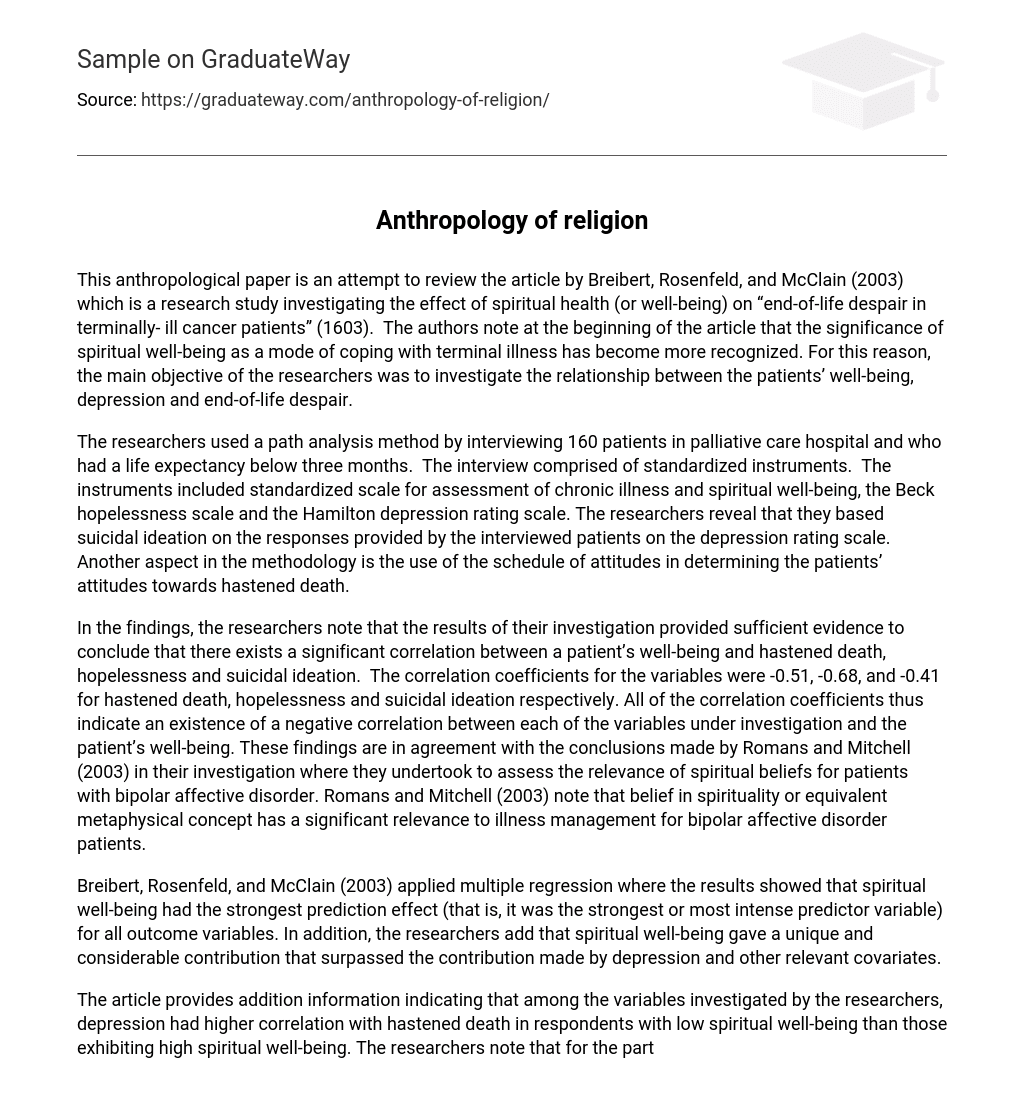This anthropological paper is an attempt to review the article by Breibert, Rosenfeld, and McClain (2003) which is a research study investigating the effect of spiritual health (or well-being) on “end-of-life despair in terminally- ill cancer patients” (1603). The authors note at the beginning of the article that the significance of spiritual well-being as a mode of coping with terminal illness has become more recognized. For this reason, the main objective of the researchers was to investigate the relationship between the patients’ well-being, depression and end-of-life despair.
The researchers used a path analysis method by interviewing 160 patients in palliative care hospital and who had a life expectancy below three months. The interview comprised of standardized instruments. The instruments included standardized scale for assessment of chronic illness and spiritual well-being, the Beck hopelessness scale and the Hamilton depression rating scale. The researchers reveal that they based suicidal ideation on the responses provided by the interviewed patients on the depression rating scale. Another aspect in the methodology is the use of the schedule of attitudes in determining the patients’ attitudes towards hastened death.
In the findings, the researchers note that the results of their investigation provided sufficient evidence to conclude that there exists a significant correlation between a patient’s well-being and hastened death, hopelessness and suicidal ideation. The correlation coefficients for the variables were -0.51, -0.68, and -0.41 for hastened death, hopelessness and suicidal ideation respectively. All of the correlation coefficients thus indicate an existence of a negative correlation between each of the variables under investigation and the patient’s well-being. These findings are in agreement with the conclusions made by Romans and Mitchell (2003) in their investigation where they undertook to assess the relevance of spiritual beliefs for patients with bipolar affective disorder. Romans and Mitchell (2003) note that belief in spirituality or equivalent metaphysical concept has a significant relevance to illness management for bipolar affective disorder patients.
Breibert, Rosenfeld, and McClain (2003) applied multiple regression where the results showed that spiritual well-being had the strongest prediction effect (that is, it was the strongest or most intense predictor variable) for all outcome variables. In addition, the researchers add that spiritual well-being gave a unique and considerable contribution that surpassed the contribution made by depression and other relevant covariates.
The article provides addition information indicating that among the variables investigated by the researchers, depression had higher correlation with hastened death in respondents with low spiritual well-being than those exhibiting high spiritual well-being. The researchers note that for the participants who exhibited low spiritual well-being, depression provided a correlation of 0.40 at a p-value less than 0.0001 while those with high level of spiritual well-being had r=0.20 at p-value= 0.06.
In conclusion, the article concludes that spiritual well-being is essential in giving protection to the patients against end-of-life despair. The researchers conclude by offering a recommendation for more controlled research to focus on assessing the impact of spirituality-based interventions, which the authors believe that can help in creating more sense of peace for patients.
Works Cited:
Breitbart W., Rosenfeld, B. & McClain, C. “Effect of spiritual well-being on end-of-life despair in terminally-ill cancer patients” The Lancet, Volume 361, Issue 9369 (2003): 1603-1607
Romans S., & Mitchell L., “Spiritual beliefs in bipolar affective disorder: their relevance for illness management” Journal of affective disorders (2003)





